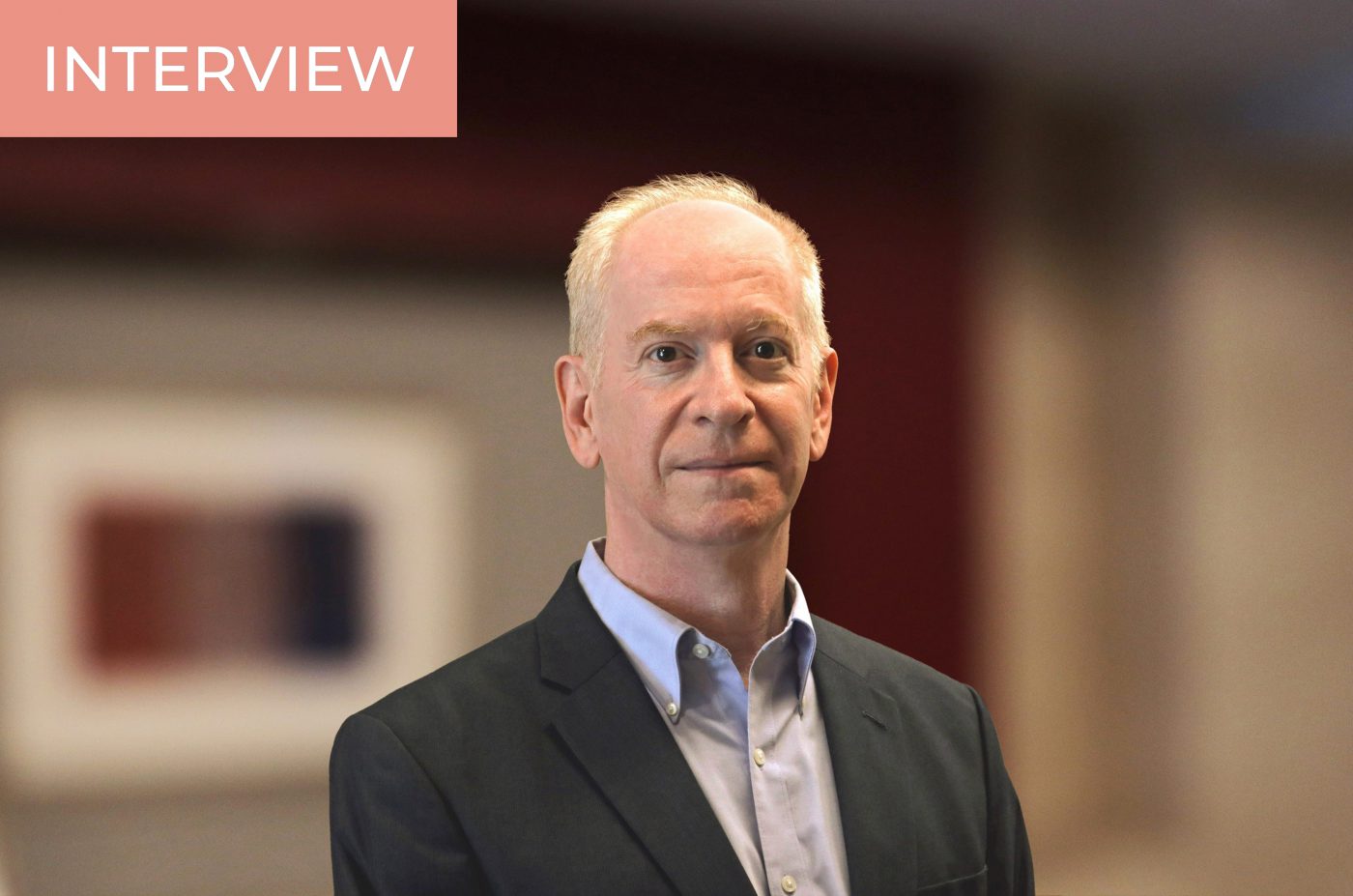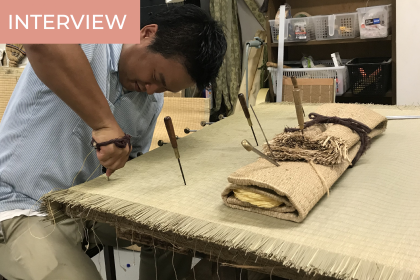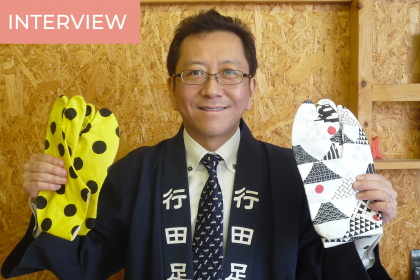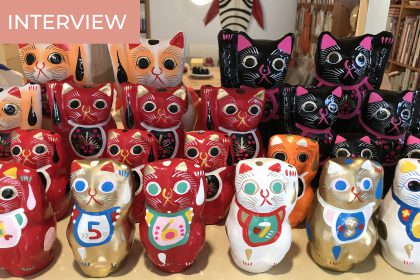In the spring of 2021, I participated in a Laurasian Institution panel discussion on launching Japan-related careers. One of the most common follow-up questions I received after the discussion was, “How can I build a career in Japanese-English translation?”
I did my best to answer these questions at the time. However, even though I speak Japanese and use the language in my work, I’m far from an authority figure when it comes to translation. Thankfully, as I got to know Richard Berger, Director of Communications for Link Global Solution Inc., I realized that I had found the perfect person to tackle that question. And that’s how the idea for this interview was born.
Richard—who grew up in Atlanta, Georgia, and moved to Southern California during high school—has worked in Japan for decades and has a fascinating career path that, with 20 years of PR work at Canon, includes plenty of translation. Read on to learn how a simple conversation launched Richard’s very own Japan-related career, his advice on becoming a self-made translator, and his thoughts on language learning.
Blazing a Trail to Japan
What originally attracted you to Japan and how did you launch your Japan-related career?
I originally majored in music at California State University, Northridge (CSUN). I was in the wind ensemble and we were invited to perform a concert at a music educators’ conference in Tokyo. I had always been interested in Japan. I started training in karate during my first year of university, and I loved Japanese food. I had also always been curious about the language. I wanted to know how the writing system worked.
I took Japanese 101 a year before the concert, so I had studied Japanese and did quite well. It was a two-week concert tour that included performances at high schools and brief homestays with Japanese families. Despite having studied Japanese for a year, the conversations with the families were disasters. I was frustrated and flustered and vowed to come back and conquer the language, even if it killed me.
After the concert tour, I applied to an overseas study program through the Cal State University network. A year later I was off to study at Waseda University and live with a Japanese family for one year. My language ability took off from there. I extended my stay for a year, studying at Waseda’s language institute, and then returned to CSUN to finish my studies. Before I had left for Japan to study, I had come to the realization that I didn’t have any real musical talent [laughs], so I changed my major to graphic design.
I kept working on my Japanese after my two years at Waseda and made a lot of great friends at CSUN, some of whom I’m still in touch with today. By the time I graduated, I had a lot of connections, and a good friend of mine introduced me to the Los Angeles bureau chief of Nippon Television (NTV) International Corporation. I told him, “My goal is to return to Japan and work, but I don’t know what I would do.” He said, “Well, why don’t you work for us for a while? We’ll see what we can do.”
I would encourage anyone who wants to establish themselves in Japan, be it socially or in business, to create networks. Treat people with respect and assume that many of the relationships that you form may be long-term.
So, I worked there for a year and a half. We mainly did sports news and that sort of thing. Through NTV, I got a journalist visa and came back to Japan in 1990. I joined a talent agency and was doing television, radio, and speaking engagements. I may even have appeared in a movie or two along the way [laughs].
I later got married and after my first child was born, I realized that I needed to find more stable work. One field that seemed to match my skill set was public relations. So, I applied to a few places and got a job at a PR agency. That didn’t work out, but then I landed a job at Canon. Twenty years later, I moved to Link Global Solution Inc., a company that provides intercultural communication training. I also provide language support for a few other companies.
I see a theme here. It seems like networking and getting to know people propelled your career forward. Is that correct?
Yes. I would encourage anyone who wants to establish themselves in Japan, be it socially or in business, to create networks. Treat people with respect and assume that many of the relationships that you form may be long-term.

Advice on Becoming a Translator and Learning Japanese
If you don’t like writing or language, it’s going to be a very difficult path.
One of the reasons I reached out to you for this interview is that college students and recent graduates often ask me how to establish a career in translation. Of course, the traditional method is to go out and get various certifications, but you have a unique path. What advice do you have for someone who wants to become a translator?
That’s a big question. First of all, it will benefit you if you truly love language. If you don’t like writing or language, it’s going to be a very difficult path. I am very fond of language, including all of its nuances. I’ve always taken a liking to writing, even in my early school days. I would always try to think of the best way to express myself in writing—the best word choice. I was fortunate to grow up in a family where words and expressing yourself concisely were highly valued.
I got my start in translating during my second year studying abroad. A classmate at Waseda had been working at an ad agency, translating campaigns into English for foreign clients. He left after the first year and gave me that job. That allowed me to dip my toes into the world of translating. The work was fascinating but also quite challenging. Keep in mind that this was pre-internet, so I had to rely on analog dictionaries, which were all carved in stone at the time [laughs].
Most of the jobs I’ve done haven’t been formal translation positions, but have included translation as a major component of the work. A lot of the PR work I did at Canon required me to translate Japanese press releases into English.

The most important thing is to be able to write clearly and concisely in your target language.
Would you say that you found career opportunities by going out into the world and “doing the work?” By completing more and more projects, you earned more recognition, which led to even more projects. Is that an accurate summary?
You really have to do it [the work]. The most important thing is to be able to write clearly and concisely in your target language—English, in my case. You don’t need to be able to speak or read Japanese perfectly as long as you have access to someone or some resource to ensure you’re interpreting the text correctly.
Thank you for saying that because that makes me feel better about my casual translation efforts. I’m still working my way through Iwata-san, a book about the former president and CEO of Nintendo. The first part is not very hard to read because it recounts personal history and stays in familiar territory. Now, I’m in a part of the book where Iwata-san shares more philosophical advice. I can recognize the words on the page, but there’s something about his writing and speaking style that throws me for a loop. So, I often have to ask friends to explain it to me to make sure my understanding is accurate.
Are you having any “aha” moments along the way?
Occasionally…
Then you’re doing what it takes to get yourself up to that next level. It’s hard, and it’s frustrating, but you need to do that.
Assuming you have the necessary skills and abilities, you need to start getting the word out. That means it’s essential that you network and get information from reliable sources.
Thanks—that’s great to hear. Let’s go deeper into the topic of career building. Considering everything that you learned from your career path while simultaneously considering all of the technology and online social networks available today, what immediate steps can an aspiring translator or interpreter take to start building their career?
Assuming you have the necessary skills and abilities, you need to start getting the word out. That means it’s essential that you network and get information from reliable sources. I’m not a member, but one such organization is the Japan Association of Translators. There are also agencies such as Torindo Co. Ltd. and Toin Corporation that offer translation work. Registering with them might help you get a foot in the door.
I’m one of the 471 Americans that aren’t on Facebook [laughs], but I would think there are some useful Facebook groups out there. I know that you can connect to people on LinkedIn who can offer advice and guidance as well.
Lastly, I’ve heard good things about a book by Corinne McKay called How to Succeed as a Freelance Translator.[AG3] It’s not specifically about English and Japanese translation, but I think there’s some very good information and advice in there regardless.
Japanese English
Japan is famous, or shall I say infamous, for awkward English on products, advertisements, and public signage. In a world where we can easily access global resources to generate accurate translations, why are these odd, occasionally offensive, translations still so prevalent? Almost everyone, including many of us on the Kokoro Media team, has a theory about this, but we’d like to hear your thoughts.
As for the clunky, or funky, ad slogans that you see on products or in commercials, I actually don’t have a big problem with them because they’re meant for a Japanese audience. The people who create them have probably done some market research to find out what resonates with their audience. Sure, some of these translations sound quite silly, but they aren’t intended for native-English speakers.
I think it’s stranger when someone who clearly has no deep understanding of English has been tasked with creating content that is clearly intended for a native English-speaking audience. Japan has a very fraught relationship with English. So many people have spent so many years studying it, and I think some of the people in decision-making positions have developed a false sense of confidence about their English abilities.
This is something that I wrote about once on LinkedIn. There was a time when I was translating a Canon publication, trying to make it as clear and concise as possible. When the Japanese general manager checked it, he said, “You know, Japanese people don’t know this word.”
I replied, “Wait—is this for a Japanese audience? This is English, so I thought…”
“No, it’s not for a Japanese audience. But Japanese people aren’t familiar with this word, so…”
We went around in circles, and basically, this was his high-context way of telling me to change the word to one that Japanese people knew. It was just a way to satisfy his need for the publication to be within the realm of his understanding.
Final Thoughts: Home is Where the Heart Is
The Japanese expression “sumeba miyako” comes to mind: if you live somewhere long enough, it becomes home.
You’ve been in Japan for a long time. Beyond family and career, what keeps you here? What aspects of Japanese culture resonate with you?
The Japanese expression sumeba miyako [住めば都] comes to mind: if you live somewhere long enough, it becomes home. That’s the case for me. I’ve felt the pull of Japan since I was in college. As I mentioned, I love Japanese food and trained in karate, which I still practice. I’m fascinated by Japanese design and aesthetics. I’ve lived here so long, and I only have a handful of friends back in the United States. My wife tells me, “What makes you special here is because you’re here. If you go back to the United States, you’re just another American.” I guess that’s my dear wife’s way of describing my value [laughs]. I guess she’s saying that there’s more that I can contribute here. I can be a bridge between cultures, speak on language issues, offer insight where applicable, and so on.
I won’t completely rule out the idea of ever moving back, but it’s not something I see myself doing in the near future. I’m also disturbed by the divisions that have increased in the U.S. these days. It’s so politically divided right now. That’s not something I’m in a hurry to get back to.
I can certainly relate to that. We both agree that Japan is a great place to live, but there are always some things that we’d like to see change. Is there anything about Japan that you wish would change?
That’s a tough question… If the summers could be less brutal, that would be nice [laughs]. Of course, Japan has its share of problems. Two things in particular that I’d like the country to address are its hostage justice system and child abductions. But, I’m not in a rush to point out areas where Japan is lacking. Especially when compared with the issues that the United States currently faces.




